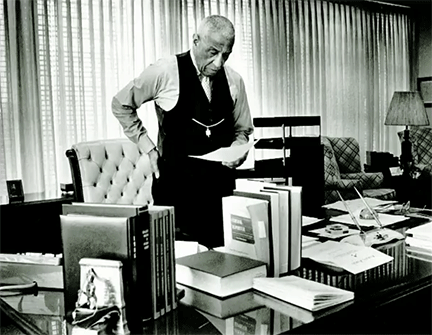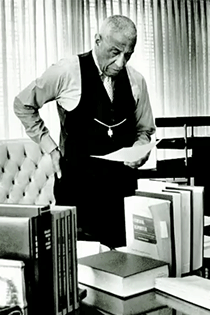
“Don’t let anything throw you off the goal you set for yourself.”
—George N. Leighton
By Tea Fani
As a young lawyer in Chicago, during a time of blatant racial discrimination, the Honorable Judge George N. Leighton (ΦBK, Howard University, 1972) had all odds stacked against him. Leighton was not allowed to join the American Bar Association or the Chicago Bar Association and could not even rent office space in most buildings in downtown Chicago. Restaurants and taxi drivers refused him service. Yet, despite the adversity he faced, Leighton has had extraordinary achievements throughout his lifetime. He became an attorney, judge, professor of law, civil rights advocate, and a legal legend who has made a difference in the lives of hundreds of Americans.
Professional success, Leighton once said, can be attained through “study, the love of learning, and high standards of personal performance at all times, in all things, and in all ways.” He celebrated his 100th birthday on October 22, 2012.
Leighton was born on October 22, 1912, in New Bedford, Massachusetts. After completing the sixth grade, he dropped out of school to work and help support his family. As a teenager during the Great Depression, Leighton worked in cranberry bogs, restaurants, and on an oil tanker. He was unable to enter high school, but his hunger for knowledge drove him to become an avid reader and attend night school to obtain the education he deeply desired. After winning a $200 scholarship from a writing contest, Leighton applied to Howard University. The university accepted him as an unclassified student despite his not having a high school diploma. Leighton excelled academically, earning a place on the Dean’s Honor Roll throughout his four years at Howard and graduating Magna Cum Laude from the College of Liberal Arts. Leighton went on to receive a law degree from Harvard University and begin his legal career in Chicago. To this day, Leighton has been outspoken about the important role of higher education in his success. According to one online profile, Leighton said that professional success can be attained through “study, the love of learning, and high standards of personal performance at all times, in all things, and in all ways.”
Wanting to provide more opportunities for minorities to pursue higher education, Leighton teamed up with Ronald S. Miller, senior partner at Miller, Shakman & Beem. Together, they created scholarship programs, persuaded local law schools to waive tuition for minority students, and raised funding to pay for education expenses. According to Chicago Lawyer, Miller fondly praises Leighton’s “great dignity and acute sense of the law’s ability to protect people who would otherwise be defenseless.” Leighton makes dreams come true every year by sending a half-dozen African-American and Latino students to law school.
Leighton has defended clients in criminal matters, as well as in cases involving voting rights, fair housing, integrated schools, and equal access to jury service. He sees the practice of law as an opportunity to serve and protect people and their rights. One of his most famous cases involved Harvey E. Clark Jr., an African-American war veteran who was attempting to rent an apartment in an all-white neighborhood in Cicero, Illinois. Leighton obtained an injunction to allow Clark and his family to move into the apartment despite racist protests from the community.
When the Clark family moved into their new residence, the Cicero police forcibly removed them from the neighborhood. The apartment building was set on fire in an ensuing riot. Leighton was unfairly targeted and indicted for conspiring to incite the riot. According to the Chicago Daily Law Bulletin, Leighton commented: “I had many sleepless nights worrying about the fact that I might be convicted and everything I had worked for would be destroyed.” The charges against Leighton were eventually dropped, but taught him that the United States justice system could easily charge and convict innocent people. “I can’t think of a greater cruelty to impose on a human being than to be put in a prison, no matter how small or large, for a crime you didn’t commit and a crime your imprisoners know you didn’t commit,” Leighton said according to Chicago Daily Law Bulletin. After his indictment, he became passionate about prisoners’ rights and undertook several capital punishment cases, saving many individuals from state execution.
Leighton retired at the age of ninety-nine after more than forty years in private practice. He has represented hundreds of clients in criminal and civil rights cases, many times without any compensation. His indomitable spirit, brave perseverance, and dedication to justice, make him a truly remarkable role model. Even when everyone expected Leighton to fail, he triumphed, demonstrating that dedication and passion can lead to success, even in the face of great adversity.
Tea Fani is a senior at Kenyon College majoring in political science. Kenyon College is home to the Beta of Ohio chapter of Phi Beta Kappa.
Homepage photo of Judge Leighton by Betsy Dynaco.




